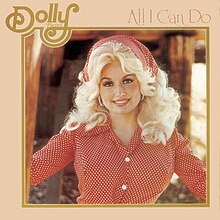
"I Will Always Love You" is a song written and originally recorded in 1973 by American singer-songwriter Dolly Parton. Written as a farewell to her business partner and mentor Porter Wagoner, expressing Parton's decision to pursue a solo career, the country single was released in 1974. The song was a commercial success for Parton, twice reaching the top spot of the US Billboard Hot Country Songs chart: first in June 1974, then again in October 1982, with a re-recording for The Best Little Whorehouse in Texas soundtrack.

Trio is a collaborative album by American singers Dolly Parton, Linda Ronstadt, and Emmylou Harris. It was released on March 2, 1987, by Warner Bros. Records. The album has platinum certification in the U.S. for sales of one million copies, and has total worldwide sales of approximately four million. A second collaborative album, Trio II, was released in 1999.

Coat of Many Colors is the eighth solo studio album by American singer-songwriter Dolly Parton. It was released on October 4, 1971, by RCA Victor. The album was nominated for Album of the Year at the 1972 CMA Awards. It also appeared on Time magazine's list of the 100 Greatest Albums of All Time and at No. 257 on Rolling Stone's 2020 list of the 500 Greatest Albums of All Time. Parton has cited the title track on numerous occasions as her personal favorite of all the songs she has written.

Dolly is the sixteenth solo studio album by American entertainer Dolly Parton. It was released on September 15, 1975, by RCA Victor. To differentiate it from Parton's 2009 4-disc, career-spanning box set, which is also titled Dolly, the album is sometimes referred to as Dolly: The Seeker – We Used To.

Porter & Dolly is the thirteenth and final collaborative studio album by Porter Wagoner and Dolly Parton. It was released on August 4, 1980, by RCA Victor. The album is made up of previously unreleased material recorded during Wagoner and Parton's duet years (1967–76), with new studio overdubs. It was released as part of a settlement from legal action Wagoner took against Parton following her departure from his band and syndicated television series. Two singles were released from the album. "Making Plans" peaked at number two on the Billboard Hot Country Singles chart and "If You Go, I'll Follow You" peaked at number 12.

Bubbling Over is the twelfth solo studio album by American singer-songwriter Dolly Parton. It was released on September 10, 1973, by RCA Victor. The album cover photo was shot by Nashville photographer Les Leverett near the fountain at the Country Music Hall of Fame.
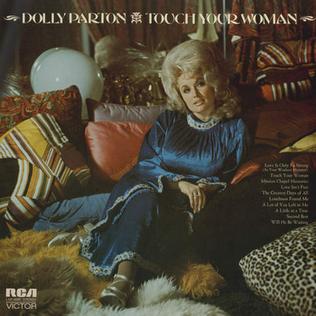
Touch Your Woman is the ninth solo studio album by American singer-songwriter Dolly Parton. It was released on March 6, 1972, by RCA Victor. The album's title song and single, "Touch Your Woman", was nominated for a Grammy.

The Best of Dolly Parton is a compilation album by American singer-songwriter Dolly Parton. It was released on November 9, 1970, by RCA Victor. The album was produced by Bob Ferguson. It includes some of Parton's early hits, a few non-single album tracks, and two previously unreleased tracks. The album peaked at number 12 on the Billboard Top Country Albums chart. The single, "Mule Skinner Blues " peaked at number three on the Billboard Hot Country Songs chart and earned Parton a nomination for Best Female Country Vocal Performance at the 13th Annual Grammy Awards. The album was certified Gold by the RIAA on June 12, 1978, for sales of 500,000 copies.
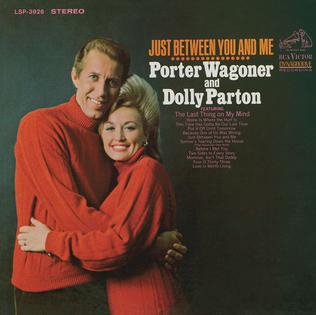
Just Between You and Me is the first collaborative studio album by Porter Wagoner and Dolly Parton. It was released on January 15, 1968, by RCA Victor. The album was produced by Bob Ferguson. It peaked at number eight on the Billboard Top Country Albums chart and spawned one single, "The Last Thing on My Mind", which peaked at number seven on the Billboard Hot Country Songs chart.

Just the Two of Us is the second collaborative studio album by Porter Wagoner and Dolly Parton. It was released on September 9, 1968, by RCA Victor. The album was produced by Bob Ferguson. It peaked at number five on the Billboard Top Country Albums chart and number 184 on the Billboard 200 chart. The album spawned three singles. "Holding on to Nothin'" and "We'll Get Ahead Someday" were top ten hits on the Billboard Hot Country Songs chart, peaking at numbers seven and five, respectively. The third single, "Jeannie's Afraid of the Dark", peaked at number 51.

Just Because I'm a Woman is the second solo studio album by American singer-songwriter Dolly Parton. It was released on April 15, 1968, by RCA Victor. The album was produced by Bob Ferguson. It peaked at number 22 on the Billboard Top Country Albums chart. The album's title track was the only single released and it peaked at number 17 on the Billboard Hot Country Singles chart.
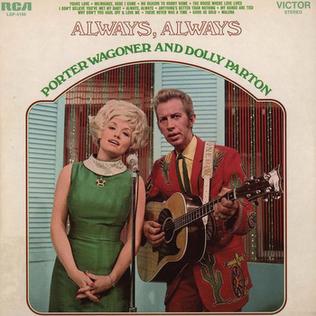
Always, Always is the third collaborative studio album by Porter Wagoner and Dolly Parton. It was released on June 30, 1969, by RCA Victor. The album was produced by Bob Ferguson. It peaked at number five on the Billboard Top Country Albums chart and number 162 on the Billboard 200 chart. "Yours Love" and the album's title track were released as singles, peaking at numbers nine and 16, respectively.

The Fairest of Them All is the fifth solo studio album by American singer-songwriter Dolly Parton. It was released on February 2, 1970, by RCA Victor. The album was produced by Bob Ferguson. It was the first of Parton's albums on which she wrote the majority of the songs without a co-writer. The Fairest of Them All peaked at number 13 on the Billboard Top Country Albums chart. The album's only single, "Daddy Come and Get Me", peaked at number 40 on the Billboard Hot Country Songs chart.

Porter Wayne and Dolly Rebecca is the fourth collaborative studio album by Porter Wagoner and Dolly Parton. It was released on March 9, 1970, by RCA Victor. The album was produced by Bob Ferguson. It peaked at number four on the Billboard Top Country Albums chart and number 137 on the Billboard 200 chart. Two top ten singles were released from the album, "Just Someone I Used to Know" and "Tomorrow Is Forever", peaking at numbers five and nine, respectively. "Just Someone I Used to Know" was nominated for Best Country Performance by a Duo or Group at the 12th Annual Grammy Awards.

Once More is the fifth collaborative studio album by Porter Wagoner and Dolly Parton. It was released on August 3, 1970, by RCA Victor. The album was produced by Bob Ferguson. It peaked at number 7 on the Billboard Top Country Albums chart and number 191 on the Billboard 200 chart. The album's single, "Daddy Was an Old Time Preacher Man", peaked at number 7 on the Billboard Hot Country Songs chart and was nominated for Best Country Performance by a Duo or Group at the 13th Annual Grammy Awards.
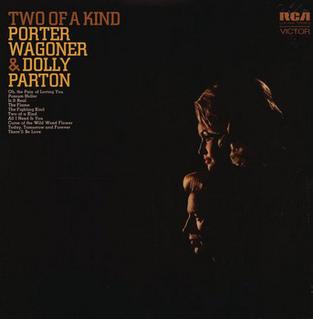
Two of a Kind is the sixth collaborative studio album by Porter Wagoner and Dolly Parton. It was released on February 8, 1971, by RCA Victor. The album was produced by Bob Ferguson. It peaked at number 13 on the Billboard Top Country Albums chart and number 142 on the Billboard 200 chart. No singles were released from the album, but "Oh, the Pain of Loving You" was included as the B-side of the 1971 single "The Right Combination".

The Best of Porter Wagoner & Dolly Parton is a compilation album by Porter Wagoner and Dolly Parton. It was released on July 19, 1971, by RCA Victor. The album contains tracks from each of their collaboration albums released up to that point, with the exception of 1969's Always, Always. The album included one previously unreleased track, the Grammy-nominated single, "Better Move It on Home".

The Right Combination • Burning the Midnight Oil is the seventh collaborative studio album by Porter Wagoner and Dolly Parton. It was released on January 3, 1972, by RCA Victor.
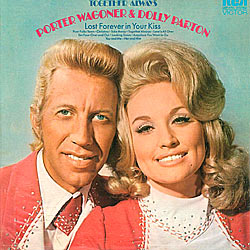
Together Always is the eighth collaborative studio album by Porter Wagoner and Dolly Parton. It was released on September 11, 1972, by RCA Victor.
"The Last Thing on My Mind" is a song written by American musician and singer-songwriter Tom Paxton in the early 1960s and recorded first by Paxton in 1964. It is based on the traditional lament song "The Leaving of Liverpool". The song was released on Paxton's 1964 album Ramblin' Boy, which was his first album released on Elektra Records.
